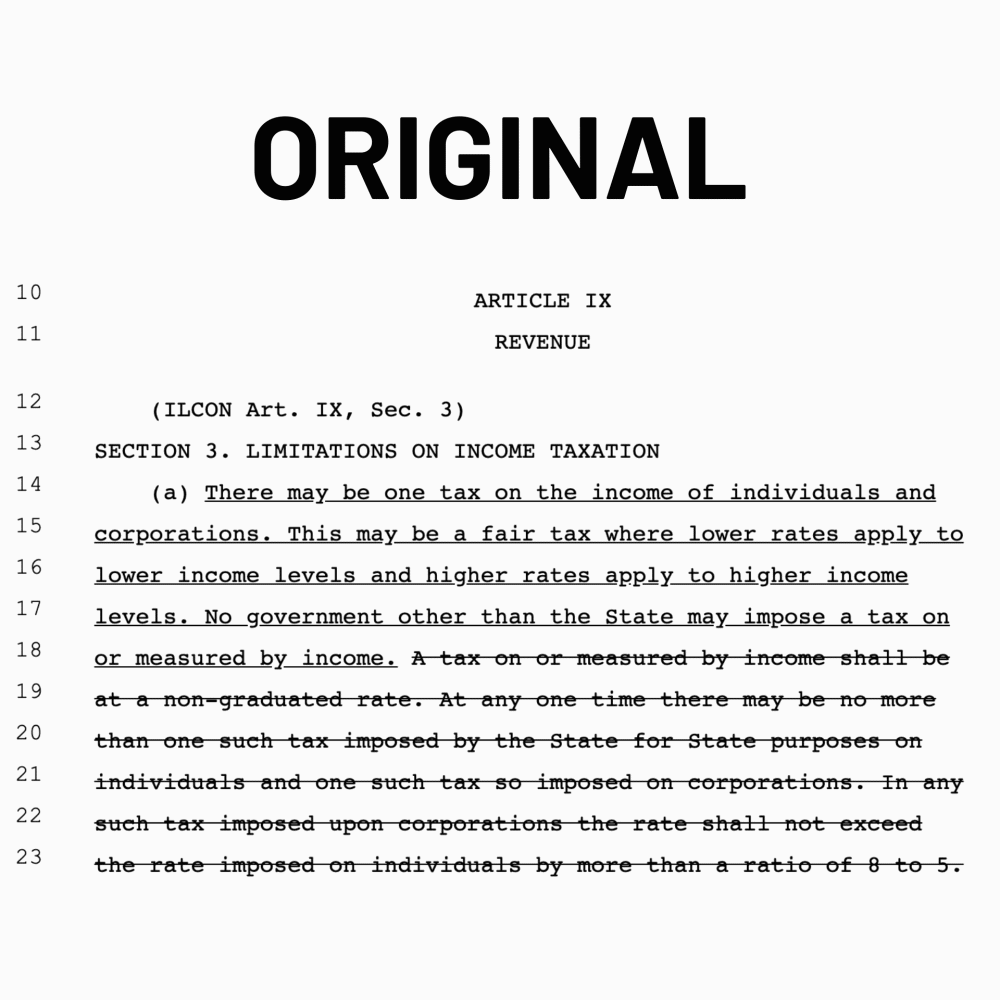Pritzker’s ‘fair tax’ is really an ‘anything goes tax,’ with no taxpayer protections
Lawmakers scrapped any requirement that the progressive income tax be ‘fair,’ giving Springfield a blank check when it comes to taxing income.
In defending his “fair tax” amendment, Gov. J.B. Pritzker has said, “People like me should pay more,” meaning the wealthy, and “people like you should pay less,” meaning the less well-off. But a closer look at the language shows nothing in the proposed constitutional amendment makes that true.
The progressive tax question facing voters Nov. 3 contains no limits on the number of taxes the legislature can impose on income. It doesn’t limit the rates that can be applied to different levels of income. It doesn’t protect against local income taxes.
It didn’t start out that way.
Last-minute changes drastically altered the ‘fair tax’ now facing voters
The original constitutional amendment introduced in the Illinois Senate:
- Maintained the limitation of one tax on individual income and one tax on corporate income.
- Specified the state could impose a “fair tax where lower rates apply to lower income levels and higher rates apply to higher income levels.”
- Prohibited local governments from imposing income taxes on their own, reading, “no government other than the State may impose a tax on or measured by income.”
But before voting on the proposed constitutional amendment, which passed both the House and Senate, lawmakers removed all three of these protections.
No more ‘one tax’ rule
Specifically, lawmakers changed the amendment they put before voters and are asking to delete this line from the Illinois Constitution: “At any one time there may be no more than one such tax imposed by the State for State purposes on individuals and one such tax so imposed on corporations.”
No protection was offered to replace this language.
Todd Maisch, president and CEO of the Illinois Chamber of Commerce, raised concerns about this issue in committee testimony.
“If somebody decides there’s a need for another income tax increase, I think it’s going to look a lot like a ‘special assessment for public safety.’ It’s going to be a ‘special tax dedicated to education.’ It’s going to go under that guise,” Maisch said.
“It also allows [for] taxation of certain kinds of income a second or third time,” he added. Maisch referenced carried interest and agriculture as two examples of income that could be subject to special additional taxation should this protection be eliminated.
A ‘fair tax’ becomes an ‘anything goes tax’
The original resolution specifically would have allowed the General Assembly to pass a “fair tax where lower rates apply to lower income levels and higher rates apply to higher income levels.”
But that language was removed with the Senate amendment, with no protection to replace it. The proposed constitutional amendment passed by the General Assembly now reads: “The General Assembly shall provide by law for the rate or rates of any tax on or measured by income imposed by the state.”
That means under the current amendment, the state could technically pass an explicitly regressive tax, where lower income residents pay a higher income tax rate than wealthy residents, even though the official ballot description incorrectly claims otherwise.
Why would the General Assembly remove the requirement that the tax be a “fair” tax? It is difficult to tell, but the result is they have the power to tax income without restraint. And with the revenue shortfalls from the COVID-19-induced downturn, as well as continued state spending in excess of revenues, the temptation will be strong to bring in as much money as possible.
Removing a ban on local income taxes
In the original amendment language, it stated that “No government other than the State may impose a tax on or measured by income.” This provision was also removed in the final version of the amendment question. The reason for this is unclear, but another article of the Illinois Constitution already allows home rule units to impose a local income tax with the approval of the General Assembly, and that provision would not be repealed in any version of the amendment.
The General Assembly has never approved a local income tax. Part of the reason for that is because of the current flat tax protection. Under the progressive tax, local governments would be able to target specific income brackets for taxation one at a time, making it much easier to get a “yes” vote in the General Assembly. Because of this, the progressive tax amendment could mean not only state tax hikes, but local tax hikes as well.
In reality, the “fair tax” amendment that’s been proposed is really an “anything goes tax” amendment. The amendment allows the General Assembly by a simple majority to pass as many income taxes on individuals and corporations as it wants, and then the General Assembly can structure that tax in any way it wants. If voters agree to remove the current flat tax protection, lawmakers will no longer be held accountable by voters for raising taxes – as happened after the 2017 tax hike when nearly 30% of state lawmakers retired or were replaced. Without even any of the taxpayer protections lawmakers initially crafted into the amendment proposal, the “fair tax” would be a blank check for ever-higher taxation.
This “anything goes tax” would only add to the uncertainty that Illinois small businesses face amid the COVID-19-induced economic devastation. If it passes on the November ballot, the progressive income tax would take effect in January 2021 – a time when Illinoisans should be recovering from the COVID-19 shutdown. More than 100,000 small businesses would face tax increases of up to 47%. As businesses determine whether they can reopen, much less keep all their employees, this uncertainty would extend to the record number of those who have lost work due to the shutdown and are having trouble returning to work.
Now is not the time for a tax hike on struggling businesses and families, much less taxing power without restriction. Voters should recognize the power they would be giving state lawmakers to tax who they want, how they want, and as many times as they want if the progressive tax is approved.

